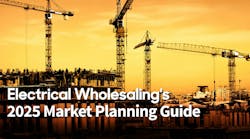Latest from Data & Training
Employment Data at the MSA & State Level
Building Permits: MSA & State
Sponsored
Dodge Says Large Construction Projects Pushed New Construction Starts to a +15% Gain in June
New construction starts in June climbed 11% to a seasonally adjusted annual rate of $896.3 billion, according to Dodge Data & Analytics. The increase marked the second double-digit gain in a row, following the 15% hike that was reported for May.
The two large manufacturing projects were a $6.5 billion uranium processing facility in Oak Ridge TN and a $1.7 billion petrochemical plant in Port Arthur TX, while the two large office projects were the $1.8 billion Spiral office tower in New York NY and a $665 million office tower in Chicago IL. Residential building in June grew 4%, helped by growth for multifamily housing. The nonbuilding construction sector (public works and electric utilities) retreated 28% in June, pulling back after the sharp 37% increase reported in May that reflected the start of several large natural gas pipelines and rail-related projects. Through the first six months of 2018, total construction starts on an unadjusted basis were $395.7 billion, up 1% from the same period a year ago. If the volatile electric utility/gas plant category is excluded, total construction starts during the first six months of 2018 would be up 3% relative to last year.
DODGE MOMENTUM INDEX GETS A LIFT IN JUNE
June’s data raised the Dodge Index to 190 (2000=100), compared to an upwardly revised 170 for May. “The monthly pattern for construction starts will often reflect the presence or absence of very large projects, and after May received a lift from unusually large projects, it was even more true in June,” said Robert Murray, chief economist for Dodge Data & Analytics, in a press release. “Following the lackluster activity in April, the strength shown during May and June enabled the second quarter average for total construction starts to be up 3% from the first quarter, which itself was up 2% from the final three months of 2017. On that basis, one can say that the expansion for construction starts continued at a modest pace during the first half of 2018. At the same time, it’s not expected that July will get the same support from large projects that took place in June.”
“Several features of the first half of 2018 stand out, as shown by the construction start statistics,” Murray continued. “Nonresidential building so far this year has seen gains for manufacturing buildings, educational facilities, and amusement-related facilities, while office building starts have stayed close to last year’s pace. However, transportation terminal starts have not proceeded at the same robust volume that occurred in early 2017, and store construction has weakened further.
“Residential building is seeing surprising resilience from multifamily housing, even as apartment vacancy rates have moved up gradually. The public works sector is showing widespread increases this year, outweighing a slightly slower (yet still strong) pace for new pipeline projects compared to a year ago. The electric utility/gas plant category continues to decline, exerting a downward pull on total construction starts in similarity to what occurred during 2016 and 2017.
“Although the construction industry is facing increased headwinds during 2018, namely higher material prices and rising interest rates, these have yet to have a discernible negative impact on the broad level of construction starts. On the plus side, the construction industry is benefitting currently from the tailwinds of a strong economy, some easing of bank lending standards, and greater funding for federal public works programs as the result of the omnibus appropriations legislation passed in March.”


